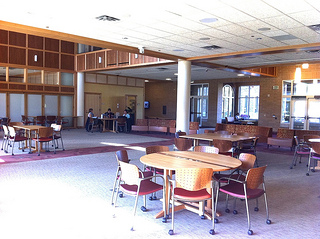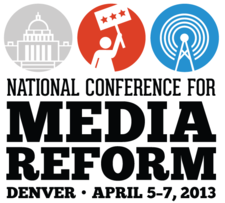APRIL 3-4:
Youth, environment, your ideas . . .
and assessing the Front Range
news ecosystem: JTM Denver, April 3-4
Moving from mourning to building –-
Rallying for the future of news and communities
at the University of Denver’s Estlow Center
CLICK TO REGISTRATION NOW
VIEW/PRINT FLYER / VIEW/PRINT INVITATION
Journalism That Matters comes to Denver for a two-day gathering for journalists, technologists, educators, students, librarians, and engaged citizens. Come prepared to document what’s working in the new news ecosystem . . . and collaborate to amplify journalism’s values, principles and purposes regardless of form.
April 3-4, 2013 / Estlow Center / Univ. of Denver
(All meetings are in Ruffato Hall /
Morgridge College of Education | 1999 E. Evans Ave. Denver, CO 80208)
Join a fast-paced, results-focused summit from 9 a.m. on Wed., April 3 through 5:30 p.m. on Thurs., April 4, 2013 in Denver; McKibben speaks Wednesday evening
“Journalism is Dead; Long Live Journalism”, is a fast-paced, results-focused summit from 10 a.m. on Wed., April 3 through 5:30 p.m. on Thurs., April 4, 2013 at the University of Denver. It’s for journalists, technologists, librarians, media educators, students and engaged citizens who want to celebrate and invent participatory journalism for the 21st century. New Yorker writer Bill McKibben will give a keynote address Wed., at 7:30 p.m. as the 2013 Estlow Center Anvil of Freedom award winner.
Answering core questions
Some body forms of journalism as we’ve known it are dead or dying. But its values, principles and purposes — a respect for truth, fierce independence — are as cherished, vital and needed as ever. The news was paid for by mass-market advertising – print and broadcast – and through print subscriptions. Those supports are shrinking – fast. Can philanthropy and donations alone pick up the slack? What core elements of the news — as we’ve known it — are really critical to sustaining and nurturing communities and participatory democracy?
What’s possible when old embodiments of journalism die and its spirit is free to take new forms?
At JTM Denver, we’ll work together to answer those questions. The answers may not be comprehensive, or best, or even fully satisfactory. They’ll be embodied in stories from the front lines about research, experiments or projects already underway. They may describe new forms of collaboration.One thing is certain: Journalists, librarians, media educators, technologists, students and citizens know the time for answers is now. The status quo won’t hold.

Conducted in JTM’s signature “Open Space” style (WATCH VIDEO) in which the discussions and breakouts are created by participants, our goal is to highlight — and invent — specific opportunities that amplify the best of what’s happening to meet the news and information needs of communities and democracy.
Program in Brief
For a detailed description, visit our program page.
Day 1 – 9:00am Registration, 10:00-5:00pm, 7:00-9:00pm Program
Just as the death of a king and celebration of his successor heralds the continuity of a realm, we convene to explore the best of what has filled the news and information vacuum created by the death of the Rocky Mountain News. In partnerhsip with the Rocky Mountain Investigative News Network, we will engage participants in charting the ways in which journalism that matters is emerging from the both legacy and emerging media in the Front Range news ecosystem. We will use Colorado’s Front Range as a source of inspiration to:
- Name the elements of a healthy news and information ecosystem
- Identify next steps to amplify good work.
Day 2 — 8:30am- Continental breakfast, 9:00-5:00pm Program
How do we amplify what’s great in the emerging journalism ecosystem?
We will explore the questions and key themes that matter to the people who attend. Examples (more below) include:
- What core elements of the news as we’ve known it are really critical to solving problems, sustaining communities and nurturing participatory democracy?
- What’s possible to do now that technology has radically changed the formats and broadened the sources of news and information?
- How is great work funded?
- What role do community broadband, public media, and other distribution platforms play?
JTM Denver will be an environment where we can answer those questions with calls to action. They’ll be embodied in stories from the front lines about research, experiments or projects already underway. They may describe new forms of collaboration. One thing is certain: We know the time for answers is now. We are moving beyond problems to envision news and information at its best and determine how to create more.
“I just wanted to change the world and look out for the little guy,” former Wall Street Journal deputy managing editor and New York Times Public Editor Barney Calame told Missouri School of Journalism students in September about why he became a reporter. “I really believe that it’s a cause.”
Join the cause.
***********
JOINT REGISTRATION: NCMR
We convene immediately before the fifth National Conference for Media Reform, also in Denver, a project of FreePress.net. Through a partnership with FreePress.net, participants in JTM-Denver may register once for both events at a combination rate. To do so, register for JTM-Denver (CLICK HERE), and select the Free Press Joint Option. Scheduled as a “pre-conference” gathering immediately before the National Conference for Media Reform, you can cross-register for BOTH events at a discounted rate.
Our convening partners
“Journalism is Dead; Long Live Journalism” is presented by Journalism That Matters (JTM), a decade-old “do-tank” whose more than 1,600 alumni of a dozen regional and national convenings are focused on connecting journalists with technologists, librarians, educators, public-policy leaders, diverse communities and engaged citizens.
Our convening partners for JTM-Denver include the Estlow Center at the University of Denver, the Rocky Mountain Investigative News Network (I-News Network), theDonald W. Reynolds Journalism Institute, at the Missouri School of Journalism, FreePress.net, the University of Colorado’s Digital Media Test Kitchen and its Center for Environmental Journalism.
JTM-Denver will include the annual Estlow Lecture, a keynote address on Wed., April 3, at 7:00 p.m.
Hotel Lodging
JTM participants are eligible to request the “FreePress” rate at the Sheraton Denver Downtown Hotel for any days from April 3-7, 2012. For details, begin registration. The Sheraton is a 15-minute light-rail ride from our Univ. of Denver meeting venue (see below). The conference rate at the Sheraton is now sold out; for other hotel options see THIS PAGE.
Transit
JTM-Denver, “Journalism is Dead; Long Live Journalism,” will take place in Ruffato Hall of the Morgridge College of Education at the University of Denver, (1999 E. Evans Ave. Denver, CO 80208-1700) (MAP) on Wednesday and Thursday, April 3-4, 2013. For details, begin registration now. Ruffato Hall is a three-block walk from the Denver metropolitan light rail stop (red, purple or blue lines), which run directly downtown to the convention center, three blocks from the Sheraton Hotel. The ride is about 17 minutes; cash fare is $2.25 and trains run approximately every half hour until at least midnight (every 15 minutes during the day).
How you can help
- Think about how you can contribute examples, ideas and expertise in our key theme and focus areas, below.
- When you register, answer our questions about the expertise and ideas you’ll be bringing.
- If you have a group or project you’d like to promote at JTM-Denver, reserve a hosting table when you register.
- Email us now: jtm@journalismthatmatters.org to be added to our mailing list for summit updates.
Example Topics
During the two days we’ll share the projects you’re working on that highlight what’s happening in the emerging news and information ecosystem. And we’ll re-new and forge new connections with colleagues in technology, librarianship, media education, and community information gathering. We’ll have a chance to make connections and start sharing ideas before we get together. And we’ll continue our collaborations long after we’ve left Denver.
Here are some examples of questions that people have raised and may be explored on site in Denver — and in pre-convening materials shared and created by participants:
- What key elements comprise the new journalism ecosystem — in Colorado and elsewhere?
- How have the values, principles and purposes of “old” journalism evolved — or remained constant?
- What has become of “the story”? How do we tell stories in the new ecosystem?
- How do youth and youth adults engage with news and information?
- What’s the role of news in sustaining communities?
- What’s do we mean by “a new ethic of public engagement?”
- How does ownership matter, and play out?
- Big data — what are the roles of personalization and user-centric databases?
- What is “slow media” and why could it important?
- How do new smaller, less institutional journalistic entities news speak truth to power?
- What might “solutions journalism”look light and how can we support it?
- How does climate change provide an important ‘frame’ for journalism?
- As “free press” issues for our century, what are the challenges and opportunities around network neutrality and community broadband?











